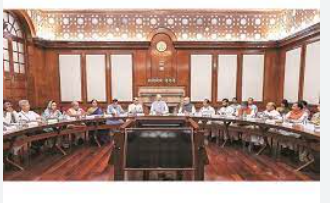Appointments Committee of the Cabinet
The Appointments Committee of the Cabinet (ACC) is a high-level committee of the Government of India responsible for making appointments to key positions in the central government, including senior civil service posts, departmental heads, and senior positions in public sector undertakings (PSUs). The ACC plays a crucial role in ensuring that the most qualified and suitable candidates are selected for these critical roles, which have a significant impact on policy implementation and governance.
Composition
The Appointments Committee of the Cabinet consists of the following members:
- Prime Minister of India (Chairperson)
- Minister of Home Affairs
- Minister in charge of the concerned Ministry or Department (when matters related to their Ministry or Department are being considered)
The ACC is one of the standing committees of the Cabinet and is supported by the Department of Personnel and Training (DoPT), which acts as its secretariat.
Functions and Responsibilities
The primary functions and responsibilities of the ACC include:
- Appointing officers at the level of Joint Secretary and above in the Central Secretariat, except for those posts that are specifically exempt.
- Making appointments to senior positions in PSUs, such as Chairpersons, Managing Directors, and Directors.
- Appointing members of various statutory and autonomous bodies, such as the Central Vigilance Commission (CVC), the Central Information Commission (CIC), and regulatory authorities.
- Approving appointments of officers on deputation to international organisations or foreign governments.
- Deciding on cases of disagreement between the DoPT and the concerned Ministry or Department regarding appointments.
Appointment Process
The appointment process typically involves the following steps:
- The concerned Ministry or Department proposes a panel of candidates for the position, along with their detailed background and suitability for the role.
- The DoPT reviews the proposal and provides its recommendations to the ACC.
- The ACC considers the recommendations and makes the final decision on the appointment.
- The appointment order is issued by the DoPT on behalf of the ACC.
In some cases, the ACC may also conduct interviews or seek additional information before making a decision.
Exemptions
Certain appointments are exempt from the purview of the ACC, such as:
- Appointments to the Indian Administrative Service (IAS), Indian Police Service (IPS), and Indian Forest Service (IFoS), which are made by the President of India on the recommendation of the Union Public Service Commission (UPSC).
- Appointments of officers below the rank of Joint Secretary, which are made by the respective Ministries or Departments.
- Appointments to certain constitutional posts, such as the Comptroller and Auditor General of India (CAG) and the Chief Election Commissioner (CEC), which are made by the President of India.
Significance
The Appointments Committee of the Cabinet plays a vital role in ensuring that the central government has the right leadership in place to effectively implement policies and programs. By carefully selecting candidates based on their merit, expertise, and suitability for the role, the ACC helps to promote good governance and efficient administration.
Moreover, the ACC’s decisions have a significant impact on the functioning of various sectors, such as finance, industry, infrastructure, and social development, as the appointees are responsible for shaping policies and making critical decisions in these areas.
Transparency and Accountability
In recent years, there has been a growing demand for greater transparency and accountability in the appointment process. To address these concerns, the government has taken steps to streamline the process and make it more objective, such as:
- Introducing the Civil Services Board (CSB) to recommend officers for senior positions, based on their performance, integrity, and suitability.
- Establishing a 360-degree performance appraisal system for officers, which takes into account feedback from multiple stakeholders.
- Creating an online database of officers’ profiles, including their educational qualifications, work experience, and performance records, to assist in the selection process.


